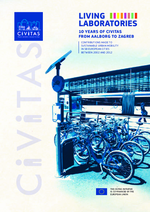ELAN
The cities of Ljubljana (Slovenia), Ghent (Belgium), Zagreb (Croatia), Brno (Czech Republic) and Porto (Portugal) joined together in the CIVITAS ELAN project for “mobilising citizens for vital cities”.

About the project
They agreed on the mission of "mobilising citizens by developing with their support clean mobility solutions for vital cities, ensuring health and access for all”.
As part of the EU CIVITAS programme, the ELAN project took an approach where “putting the citizen first” was at the core of the work in its five cities. ELAN consisted of highly experienced partners, many of were involved in the first two phases of the CIVITAS Initiative.
All participant cities were vibrant medium-sized European centres of social, cultural and economic life with strong identities, rich cultural heritage and high-quality public spaces. All were also major university cities with large student populations. These dynamic cities shared a strong commitment to implement mobility policy that gives priority to citizens and their quality of life. The ELAN cities were in critical phases of urban development with large infrastructure projects underway to improve the main interchanges and major arteries of their transport systems.
CIVITAS ELAN addressed topics of specific interest to Central and Eastern European cities. These cities faced particular challenges such as fast motorisation, capacity problems in public transport, infrastructure renewal and rapidly changing cityscapes. These rapid changes created many opportunities for cities from both old and new Member States to learn from each other.
Ljubljana, Brno and Zagreb represented cities from newer Member States or accession countries, with Ljubljana acting as the project coordinator. They brought with them extensive experience in energy-efficient technologies in public transport. CIVITAS ELAN therefore emphasised a two-way learning process, facilitated through technical workshops, training sessions and site visits.
Implementing sustainable mobility
One of the lessons the ELAN cities had already learnt through their involvement in previous CIVITAS projects was that challenges to the implementation of innovative urban transport solutions are not always of a technical nature. Instead, the main obstacles tend to be behavioural, changing implementation conditions or institutional issues.
That is why CIVITAS ELAN adopted a process-oriented approach and accentuated risk management, including contingency plans and early warning systems for project risks.
Furthermore, the project partners were well aware of the crucial importance of a citizen-centred approach. CIVITAS ELAN took the view that if decision makers are serious about considering citizens’ needs and engaging them in the implementation of solutions, better approaches to consultation and broad dialogue were needed than what had been practiced in Europe to date.
ELAN therefore experimented with inclusive governance at all stages from project planning and implementation, to monitoring and evaluation. In many cases, citizens are encouraged to contribute their own ideas and thereby directly influence mobility planning decisions.
The focus on citizen participation was incorporated into the design of the 68 activities under ELAN. This entailed dedicated participation and consultation processes and prioritised the needs and expectations of citizens, difficult to achieve or contradictory as they sometimes may have appeared to transport practitioners. Various non-governmental, citizen-driven organisations were full partners in CIVITAS ELAN and had responsibility for carrying out measures.
They provided direct links between the CIVITAS community and those working at the grassroots level locally. Aside from encouraging involvement, the CIVITAS ELAN cities wanted to pro-actively convince citizens that clean mobility solutions are in their interest. The partners wanted to show how, despite a lack of funds, overdue investments and maintenance could contribute to economic development and help build a fair and inclusive society.
Project results
ELAN aimed to increase the modal share of walking and cycling, support innovative freight delivery solutions, implement innovative demand management, and increase the use of cleaner and energy-efficient vehicles. The project enhanced overall road safety and reduce air pollution. CIVITAS ELAN enhanced the cities’ perception as pioneers of advanced mobility concepts that offer a high quality of life. This in turn attracted knowledge workers and enterprises.
In addition to the implementation of clean and sustainable urban transport solutions, CIVITAS ELAN aimed to mobilise people in physical, political and societal terms. The ELAN partners were convinced that putting citizens first can effect long-lasting change. Transferring ownership of policies to citizens not only substantially reduces the political risk of failure, but most importantly winning people’s minds and hearts can initiate a lasting new mentality towards sustainable mobility.
As a policy-driven project led by impact and process evaluation, the ELAN cities contributed to major national and EU policy processes. They motivated cities throughout Europe to follow their lead. CIVITAS ELAN brought together politicians and practitioners from various cities, countries and professional backgrounds.
It fostered exchange and advanced Europe’s knowledge economy. Furthermore, CIVITAS ELAN addressed global challenges such as climate change and security of energy supply. Ultimately, it helped to create to a cleaner and more liveable environment for citizens.
Cities
Fast Facts
September 2008 - September 2012
Project duration
38 partners
Project partners
€28,640,762
Project funding
68 measures
Measures implemented



















